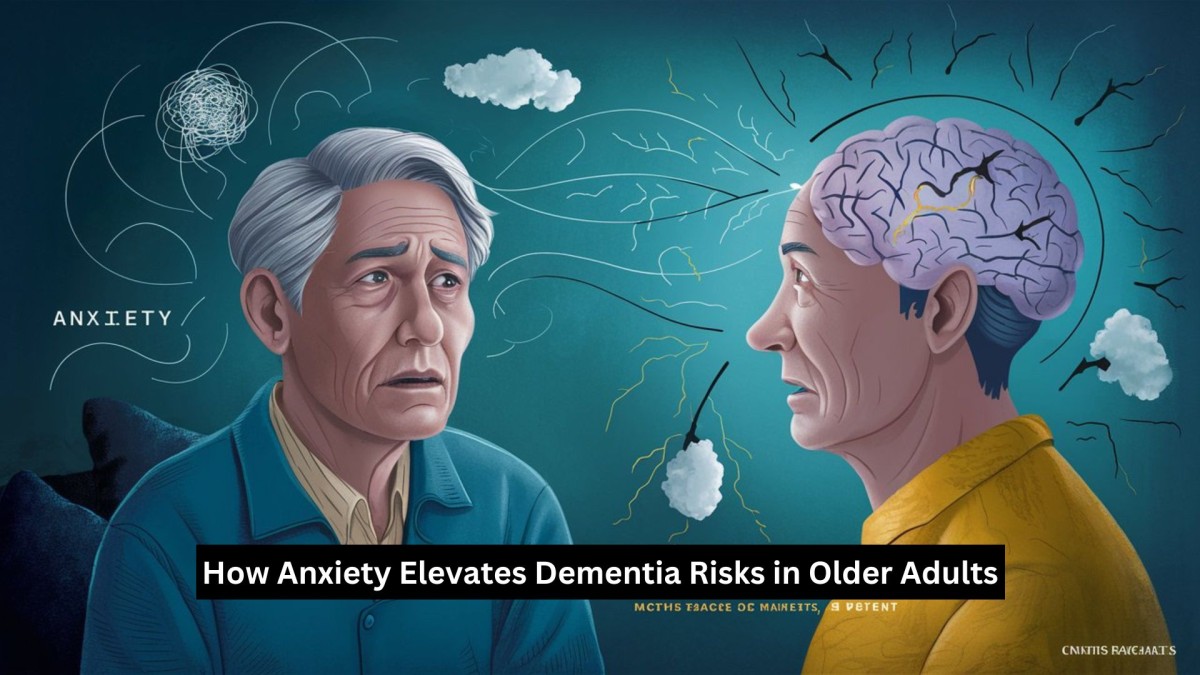It is desired that as we reach the final phases of our existence, we should be allowed to enjoy serenity. However, for some of these seniors, anxiety comes as an unfortunate thorn in the flesh which not only interrupts their sleep but also raises the likelihood of getting dementia. It might be difficult to see how anxiety has to do with dementia, but the studies linking the two are becoming more frequent. Knowledge on this kind of relationship can be very important when it comes to managing risks and promoting the welfare of individuals of advanced age. It is now time to look at the specifics of this relationship and to discuss how one can prevent anxiety and maintain brain functioning.
The Intersection of Anxiety and Dementia
 There are many aging persons who suffer from anxiety disorders that usually involve excessive and persistent worry, fear and feeling of apprehension. More often than not, anxiety is considered a field of mental health, but it can stage effects on the physical well-being and cognitive ability. In the latest researches it has been inferred that anxiety could potentially cause dementia which is characterized by a gradual loss of memory and worsening of cognitive abilities.
There are many aging persons who suffer from anxiety disorders that usually involve excessive and persistent worry, fear and feeling of apprehension. More often than not, anxiety is considered a field of mental health, but it can stage effects on the physical well-being and cognitive ability. In the latest researches it has been inferred that anxiety could potentially cause dementia which is characterized by a gradual loss of memory and worsening of cognitive abilities.
Understanding Dementia
Dementia is a general term for a set of diseases referring to deterioration of mental processes, which are Alzheimer’s disease, vascular dementia, and Lewy body dementia. It alters memory, cognitive function and resistance to misunderstanding which has devastating effects on learning, working, socializing, and living adequately on one’s own. The various factors that are known to cause dementia include genetic, environmental as well as life style.
The Role of Anxiety
Some of the symptoms may involve ruminating on the ailments, money or rank, and status and positions. This continuing pressure can produce various physiological and psychological effects that might affect the brain. Among the key elements participating in this process, there is cortisol, a hormone that plays a role of a stress indicator.
Stress and Cortisol: Stress hormone is also known as cortisol which is a hormone that works an important function on stress response. Although it is helpful in short period of time, constant increasing of cortisol in the body due to presence of anxiety is not good for our brains. General studies have revealed high cortisol has a negative effect on the brain such that it inhibits cognitive abilities and causes alterations within structures in the brain, including hippocampus which is responsible for formation of memories.
Inflammation: It should also be noted, that chronic anxiety leads to increases in the level of inflammation in our body. Increased stress and anxiety lead to the occurrence of inflammatory markers in the human body which may harm the brain. Currently, inflammation is known to affect mental health and is considered to have relations with dementia.
Neurotransmitter Imbalance: Stress affects the equilibrium of neurotransmitters that are substances in the brain that transmits signals in the neurons. Neural transmitters like serotonin and dopamine are affected, and these affect people’s mood as well as thinking capacity; therefore, affecting the later cognitive ability.
Building Cognitive Reserve
Cognitive reserve is a term that indicates the brain’s capability to perform despite the presence of damage. Some aspects of higher cognitive reserve may provide the ability to modify the effects of chronic anxiety and thus sustain the cognitive abilities that are not manifested in cognitive decline in the early stages of disease. Factors that contribute to cognitive reserve include:Factors that contribute to cognitive reserve include:
Mental Stimulation: Cognitive reserve can be created through reading books, doing puzzles, acquiring new skills especially as an adult. Recuperation to prolonged illness can be helped by engagement of good lifestyle, mental prowess, and education.
Education and Occupation: Education and receiving complex occupations correlate with higher levels of the cognitive reserve. Education and problem solving involves the use of the brain hence practicing education, business, social relationships and our legal system can enhance good brain health.
Social Engagement: Strong social relationships and engaging in social roles are helpful for the emotional support through the social contact along with acting as a defence that reduces incidence of cognitive decay. It has been demonstrated that social interaction is protective for the mental health and cognitive status of individuals.
Strategies to Manage Anxiety and Protect Cognitive Health
 Measures for Reducing Stress and Applying Preventive Measures to Mitigate Cognitive Dysfunction
Measures for Reducing Stress and Applying Preventive Measures to Mitigate Cognitive Dysfunction
It is important to note that relieving anxiety is not only a task connected with enhancing people’s psychological state – it may be instrumental in preserving cognitive functions too. Here are some strategies to manage anxiety and support brain health:Here are some strategies to manage anxiety and support brain health:
Regular Physical Exercise
Benefits for Anxiety: Exercise reduce attacks and other symptoms of anxiety as it helps in the release of endorphin among other feel good hormones. Exercise can also influence the stress hormones such as cortisol in the body.
Benefits for Cognitive Health: Exercise focuses on the following benefits of the health of the brain. It reduces impacts on the blood vessels of the brain, helps in the brain rewiring process and greatly supports brain function. Some of the best exercises for people who have insomnia include walking, swimming, and yoga in this position.
Mindfulness and Meditation
Reducing Anxiety: Cognitive restructuring and related practices can be efficiently applied to decrease the effect of anxiety by raising people’s awareness of their thoughts and emotions through practicing mindfulness and meditation. Methods, which may be useful for destressing are deep breathing, progressive muscle relaxation, and guided imagery.
Supporting Brain Health: Both these practices help enhance cognitive abilities and help to manage emotions. As such, carrying out practices in the park may help people cut down the level of anxiety they experience while improving their physiologic state.
Healthy Diet
 Nutritional Support: The intake of foods with some general healthy nutrients and other specific nutrients such as antioxidants, omega 3 fatty acids and vitamins that help to reduce inflammation also help to support brain health, or at least not harm it. Diet containing berries and other fruits, vegetables particularly leafy ones, nuts, and fatty fish is healthy for the brain.
Nutritional Support: The intake of foods with some general healthy nutrients and other specific nutrients such as antioxidants, omega 3 fatty acids and vitamins that help to reduce inflammation also help to support brain health, or at least not harm it. Diet containing berries and other fruits, vegetables particularly leafy ones, nuts, and fatty fish is healthy for the brain.
Diet and Anxiety: There are other diets that are recommended such as the Mediterranean diet which is said to reduce anxiety and enhance brain function. Introducing dense nutrient foods for formulas help in mental as well as cognitive health of the body.
Social Engagement
Emotional Support: Engaging in social activities can decrease the probability of developing social isolation and or loneliness which can trigger anxiety. This aspect can involve social interaction, interpersonal relationships and other communal related functions to help overcome stress and boost one’s well-being.
Cognitive Stimulation: Communicational activities represent forms of exercise to the brain, and this is good for the organ’s health. Activities involving the social interaction are helpful to sharpen the brain and they do not only lower the chances of developing Dementia.
Strategies to Manage Anxiety and Protect Cognitive Health
It is important to note that relieving anxiety is not only a task connected with enhancing people’s psychological state – it may be instrumental in preserving cognitive functions too. Here are some strategies to manage anxiety and support brain health:Here are some strategies to manage anxiety and support brain health:
Regular Physical Exercise
Benefits for Anxiety: Exercise reduce attacks and other symptoms of anxiety as it helps in the release of endorphin among other feel good hormones. Exercise can also influence the stress hormones such as cortisol in the body.
Benefits for Cognitive Health: Exercise focuses on the following benefits of the health of the brain. It reduces impacts on the blood vessels of the brain, helps in the brain rewiring process and greatly supports brain function. Some of the best exercises for people who have insomnia include walking, swimming, and yoga in this position.
Mindfulness and Meditation
Reducing Anxiety: Cognitive restructuring and related practices can be efficiently applied to decrease the effect of anxiety by raising people’s awareness of their thoughts and emotions through practicing mindfulness and meditation. Methods, which may be useful for destressing are deep breathing, progressive muscle relaxation, and guided imagery.
Supporting Brain Health: Both these practices help enhance cognitive abilities and help to manage emotions. As such, carrying out practices in the park may help people cut down the level of anxiety they experience while improving their physiologic state.
Healthy Diet
Nutritional Support: The intake of foods with some general healthy nutrients and other specific nutrients such as antioxidants, omega 3 fatty acids and vitamins that help to reduce inflammation also help to support brain health, or at least not harm it. Diet containing berries and other fruits, vegetables particularly leafy ones, nuts, and fatty fish is healthy for the brain.
Diet and Anxiety: There are other diets that are recommended such as the Mediterranean diet which is said to reduce anxiety and enhance brain function. Introducing dense nutrient foods for formulas help in mental as well as cognitive health of the body.
Social Engagement
 Emotional Support: Engaging in social activities can decrease the probability of developing social isolation and or loneliness which can trigger anxiety. This aspect can involve social interaction, interpersonal relationships and other communal related functions to help overcome stress and boost one’s well-being.
Emotional Support: Engaging in social activities can decrease the probability of developing social isolation and or loneliness which can trigger anxiety. This aspect can involve social interaction, interpersonal relationships and other communal related functions to help overcome stress and boost one’s well-being.
Cognitive Stimulation: Communicational activities represent forms of exercise to the brain, and this is good for the organ’s health. Activities involving the social interaction are helpful to sharpen the brain and they do not only lower the chances of developing Dementia.
Professional Help
Therapeutic Approaches: That is why, it is recommended to address an anxiety problem to a therapist or a counselor to receive practical tips on how to handle it. Such approaches as the cognitive-behavioral therapy as well as other therapies can be of help and enhance the manner in which an individual manages the symptoms.
Medication: At times, medications are administered as a way of treating anxiety symptoms that are present in an individual. It needs to have proper consultation with a healthcare provider to avoid the disorder being treated in a way that will aggravate the situation and compromise cognitive abilities.
Embracing a Proactive Approach
Some of the most important recommendations in taking care of older peoples’ mental health involve the following more specific prevention actions. It is, therefore, important to look out for the symptoms of anxiety and get the right help to greatly improve the chances of maintaining cognitive function. Families and caregivers are also involved in supporting children in nurturing practices that meet the child’s emotional and thinking styles.
Education and Awareness: The public should be educated with information concerning how anxiety increases the likelihood of dementia, so that preventive measures are taken. Knowledge of how anxiety affects the cognitive function can help in timely prevention and assistance.
Community Support: Participating in the community activities or support groups can help one to get many resources as well as social contacts. They can provide useful tips about the ways on how to handle stress, share encouraging words, and make people feel they are not alone.
The Future of Research
Thus, the present research investigates the link between anxiety and dementia and the best way to be aware of the latest studies and trends. To determine the reasons for these variations and to establish the orientation that can be used to counteract cognitive decline caused by anxiety, subsequent researches are being carried out.
Personalized Strategies: It should also be noted that further research in the sphere may result in individualized interventions for anxiety as well as cognitive reserve enhancement. Perhaps increasing the versatility of interventions could improve their impact by targeting specific characteristics of one’s life.
For related content, don't forget to visit out blogs on Mental Health Issues.
Conclusion
The association of anxiety and dementia also explain why it is very crucial to take care of you mind and try to be as healthy as you can to curb any complication that may affect you brain. Nobody denied that chronic anxiety affects the brain and it might lead to dementia. Older adults can through strategies involving the enhancement of anxiety coping outcomes, ways of increasing one’s cognitive reserve as well as ways of getting the right support that can lead to an improvement in their quality of life as well as a decrease in their rate of deterioration of their cognitive health.
